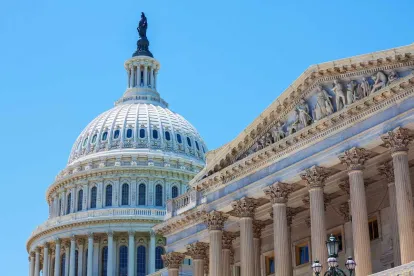The split party control in the U.S. Senate and House of Representatives will require bipartisanship to produce successful legislation over the next two years. While negotiations surrounding high-profile issues like increasing the debt limit and passing individual appropriations bills will receive much attention in the months ahead, here are 10 other issues worth watching where bipartisan support exists:
-
Data Privacy: On July 20, 2022, the House Energy and Commerce Committee reported the American Data Privacy and Protection Act, which would establish federal standards for the collection and transfer of personal data. The legislation was sponsored by incoming Republican Chairwoman Cathy McMorris Rodgers (R-WA) and ranking Democrat Frank Pallone (D-NJ), and the committee vote was 53 to 2. Similar draft legislation was circulated in the Senate. The bill stalled over provisions preempting state laws.
-
FAA Reauthorization: The existing five-year authorization of Federal Aviation Administration programs expires on September 30, 2023. Senate Commerce Committee Chairwoman Maria Cantwell (D-WA) spoke recently of her interest in considering new consumer protections and strengthening airline operations in light of the recent surge in holiday flight cancellations. The FAA reauthorization has traditionally been bipartisan.
-
Farm Bill: The 2018 farm bill also expires on September 30, 2023. The next package of farm, nutrition, and rural development programs is expected to exceed $1 trillion over 10 years. The top four lawmakers on the House and Senate Agriculture Committees – Sens. Debbie Stabenow (D-MI) and John Boozman (R-AZ) and Reps. G.T. Thompson (R-PA) and David Scott (D-GA) – return from the previous Congress and will provide continuity.
-
Online Youth Safety: A bipartisan group of Senators – Sens. Blumenthal (D-CT), Blackburn (R-TN), Cassidy (R-LA), Lummis (R-WY), and Markey (D-MA) – unsuccessfully pushed to include two bills to protect youth online in the omnibus funding bill at the end of 2022. These two bills – the Kids’ Online Protections Act and the Children and Teens’ Online Privacy Act – both passed Senate Commerce Committee in July with strong bipartisan votes. The legislation would ban ads targeting children and require additional parental controls online. Similar legislation was introduced in the House.
-
Outbound Investment Review: There is bipartisan support in both chambers for legislation to establish an interagency committee to review investments by U.S. companies in countries like China and Russia that involve critical national capabilities. The process would mirror the existing review process for inbound investments conducted by the Committee on Foreign Investments in the United States (CFIUS). Bipartisan legislation to establish this process (the National Critical Capabilities Defense Act) was introduced in the Senate by Sens. Casey (D-PA) and Cornyn (R-TX) and in the House by Reps. DeLauro (D-CT), Pascrell (D-NJ), Spartz (R-IN), and Fitzpatrick (R-PA)). The proposal was added to House-passed legislation to support semiconductor production and research (the CHIPS Act) but was not included in the final version. The White House has also been working on a draft Executive Order to implement an outbound review process. However, incoming Chairman of the House Financial Services Committee Patrick McHenry (R-NC) has urged the Biden Administration to work closely with Congress to develop a legislative solution.
-
Pandemic Preparedness: The current authorization of the Pandemic and All-Hazards Preparedness Act (PAHPA) expires in 2023. Certain structural reforms to agency oversight of pandemic preparedness were made in the omnibus spending legislation at the end of 2022, and the broader PAHPA program extensions will be debated in 2023. There are bipartisan teams in each chamber in support of this effort, led by Reps. Hudson (R-NC) and Eshoo (D-CA) and Sens. Casey (D-PA) and Cassidy (R-LA).
-
Permitting Reform: Senator Joe Manchin (D-WV) pushed unsuccessfully to add permitting reform legislation to the National Defense Authorization Act (NDAA). President Biden endorsed the Manchin proposal “as a way to cut Americans’ energy bills, promote U.S. energy security, and boost our ability to get energy projects built and connected to the grid.” Separately, Sen. Shelley Moore Capito (R-WV) introduced a comprehensive permitting reform bill last September (Simplify Timelines and Assure Regulatory Transparency (START) Act) that was cosponsored by 46 other Republican Senators. Incoming House Natural Resources Committee Chairman Bruce Westerman (R-AR) and House Energy and Commerce Committee Chairwoman Cathy McMorris Rodgers (R-WA) introduced comprehensive permitting reform as part of broader supply chain legislation, and both have indicated that the issue is a top priority.
-
Pipeline Safety: The Pipeline and Hazardous Materials Safety Administration authorization expires in 2023. Much of the focus in debating its reauthorization will be on implementing changes made in 2019 relating to public safety and pipeline spills, which will now be debated in the context of the December Keystone oil spill. There may also be a new focus on pipelines that transport carbon dioxide, which should significantly expand in the next few years. Incoming Chairman of the House Transportation & Infrastructure Committee Sam Graves (R-MO) has mentioned passage of a pipeline safety bill as one of his top priorities.
-
Safe Banking Act: In April 2021 the U.S. House of Representatives passed a bill to prohibit federal banking regulators from penalizing banks that provide services to cannabis-related businesses, by a vote of 321 to 101. A similar Senate version of the Secure and Fair Enforcement (SAFE) Banking Act had 43 cosponsors last year and reportedly had the support of 59 Senators. Attempts to attach the legislation to both the NDAA and the omnibus spending bill failed in the Senate in December. Senate Majority Leader Schumer (D-NY) supports the legislation, but Republican Leader McConnell (R-KY) has opposed it.
-
Stablecoin Regulation: Incoming House Financial Services Committee Chairman Patrick McHenry (R-NC) and ranking Democrat Maxine Waters (D-CA) sought to agree on a bipartisan approach to stablecoin regulation last year, and those discussions will continue. Rep. McHenry has announced a new Subcommittee on Digital Assets, Financial Technology and Inclusion, which will be Chaired by Rep. French Hill (R-AR). Senate Banking Committee Chairman Sherrod Brown (D-OH) is expected to work closely with the Biden Administration on any new proposals.



 />i
/>i

